Rising Young Zen Leaders Reflects National Trend
Written by: Jill Irwin
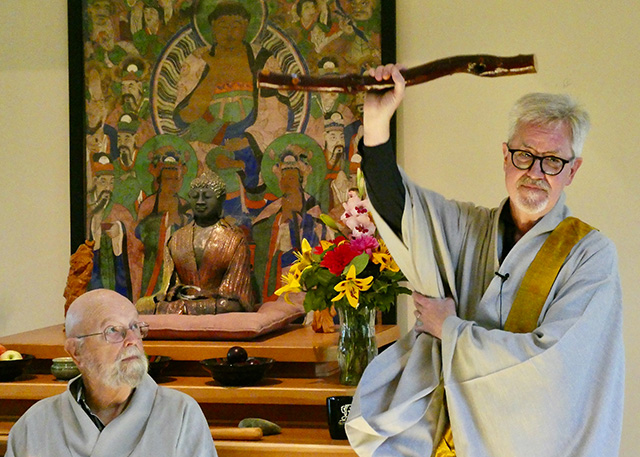
Zen Master Ji Bong witnesses Dharma transmission to Jeong Bong, with stick.
Photos by: Gerald Seminatore
In 2023 three long-term teachers moved up into leadership roles, at Blue Heron Zen Community in north Seattle.
“With a dearth of new teachers on the horizon for many sanghas,” said Blue Heron Guiding Teacher Zen Master Jeong Ji (Anita Feng), “I feel my job as guiding teacher is to train new teachers, to take the time to support those who can step into the role of teacher. I’m proud of our thriving sangha community. We have many people stepping into teaching roles.”
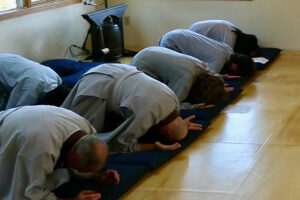
As Zen evolves in North America from its early years, teachers coming up through local sanghas such as Blue Heron reflects the maturing of Zen outside Asia.
“Beyond new teachers appearing and old teachers eventually disappearing,” Feng said, “the vitality of Zen means that whoever appears will have their own unique voice and bright light to shine on the dharma.”
Blue Heron is affiliated with the Golden Wind Zen Order, which is based in Southern California in the lineage of Zen master Seung Sahn, the first Korean Zen Master to live and teach in the West.
A new Zen master
In September, the Blue Heron sangha as well as friends and family were present as Eric Nord received transmission from his teacher Zen Master Ji Bong (Robert Moore), and Zen Master Jeong Ji. Nord is now teaching as Zen Master Jeong Bong.
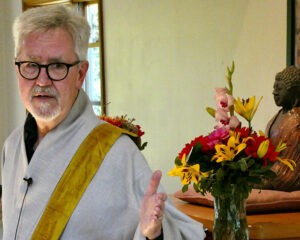
When asked about his new role and thoughts on Zen in America, Nord said, “People have been asking me about this. How do we keep this incredibly helpful tradition alive in a culture that is at many times antithetical to the values that are respected in Zen? I’m excited and hopeful to see how Zen continues to become truly American, without rejecting our roots. I feel a responsibility to keep this tradition in a culture that needs it.”
Nord initially came to Zen in the 1990s for the same reasons as lots of people. “At first it was a personal investigation into my own life, and I had a recurring need for spiritual context that kept bubbling up in my younger years. Since then, my practice has broadened out beyond the personal. As I continued to practice, I saw how intimately connected my individual life is to the world around me.”
Nord’s training included a trip to Korea in 2005, to attend the one-year ceremony of the death of Zen Master Seung Sahn, and to practice with Seung Sahn‘s students from around the world. “It was a great touchstone, to get closer to the roots of where this lineage comes from.”
Going forward, Nord said, “I see Zen in America at a sweet point…It’s an exciting and important time in terms of Zen and American culture. I think it’s really important to keep this beautiful tradition going right here where we live, honoring its roots, and also making it relevant to who we are in this time and place.”
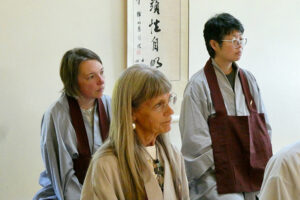
New senior dharma teachers
Earlier in the year, two senior Blue Heron dharma teachers, who already held important roles in the sangha, were conferred inka (recognition of their attainment), during a ceremony on the Blue Heron property. Paul Gulick has served as abbot since 2020, and Chris Chapman has been head dharma teacher since 2021. After the July ceremony both teachers now hold the title of Ji Do Poep Sa Nim (which translates as dharma master). Both men also feel an increased sense of humility and responsibility with their new titles.
Although both have taken on increasing roles in the sangha the last few years, Gulick said when he became a dharma master, “The responsibility really felt like something that I needed to uphold. It felt like a greater change, a very humbling one.”
Chapman mirrors this sentiment. “This new role feels like a lot of responsibility. My teaching role is different now with kong-an dialogues.” (Kong-ans, or koans, are a teaching tool in the Korean Rinzai lineage of Zen Master Seung Sahn, which dharma masters and Zen masters use with their students.)
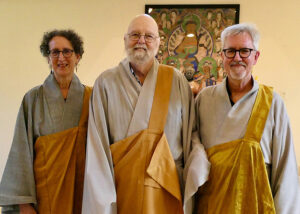
Gulick and Chapman both became interested in Zen as early as their college years. In 1986, Gulick traveled to a Zen temple in Korea for a three-month Kyol Che retreat. (This is an intensive Zen retreat, traditionally held for 90 days in summer and winter in monasteries and temples in Korea).
While that was intense at the time, and he stepped away for over a decade, Gulick came back to Zen about 15 years later.
“People come to Zen for different reasons, and if they stay, they might not stay for the same reasons as when they started,” Gulick said.
When Gulick started as a 19-year-old via martial arts, it was more of a “power practice,” he said. His return to Zen practice in his 40s, as a young widower, was triggered when he picked up a Buddhist book at a bookstore. Reading the first noble truth, life is suffering, resonated with him at that time.
“I felt a feeling of relief when I read that,” he said. “It inspired me and still does.”
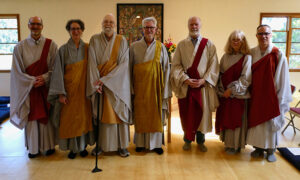
For Chapman, it was the terrorist attacks on the U.S. on September 11, 2001, that pushed him to get more serious about dharma practice.
“The 9/11 attack led me to think about, ‘What does the world need?’” he said. “That led me to Buddhist teachings, and I visited different centers.”
The same year he found his way to Dharma Sound Zen Center, which was the precursor to Blue Heron Zen. He has been practicing there ever since.
When asked about Zen in the future, Gulick said, “Zen is moment-by-moment, the practice of clear mind. But if we get attached to tradition or to some modernized version of practice, then we’re caught up in our thinking. We need to know the purpose of the traditions, to not just practice mechanically, but to practice sincerely.”
He added, “Zen is letting go of our ideas, being clear. We practice that through meditation and chanting, so we can help all beings.”
Chapman’s approach to Zen, teaching, and practice, is two-pronged. “On a personal level, being a teacher means being a student. You have to learn things more thoroughly. I don’t feel there’s something magical about being a teacher, just sit where we are. “
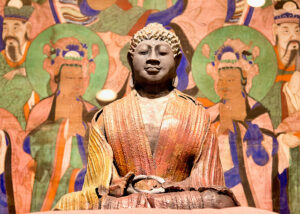
From an activity perspective, Chapman asks himself, “How do we evolve our practice? Everything always changes. When and how to change forms, well, it should be slow and intentional. We need to be respectful of our [Zen] history, but have to make things fresh.”
Guiding teacher Jeong Ji (Feng) expressed satisfaction about these directions.
“I feel really fortunate in that there is a lot of talent in our sangha,” she said. “Chris and Paul in their own different ways have been dedicated for decades, and Jeong Bong (Nord) has been dedicated beyond decades. We’ve been working closely together for many years. When a teacher gets a title, they’re already embodying that title for some time before the title comes along.”
As a touchstone, Feng quotes a short poem by 18th century Japanese poet Kobayashi Issa:
The man pulling the radishes
points the way with the radish.
She concluded, “Whoever we are, however we express ourselves, we’re pointing the way.”
Jill Irwin is a member of the Blue Heron Zen Community. She occasionally posts about everyday outdoors adventures at the Pacific Northwest Seasons blog, and considers her regular swims in the Salish Sea another form of Zen practice.
